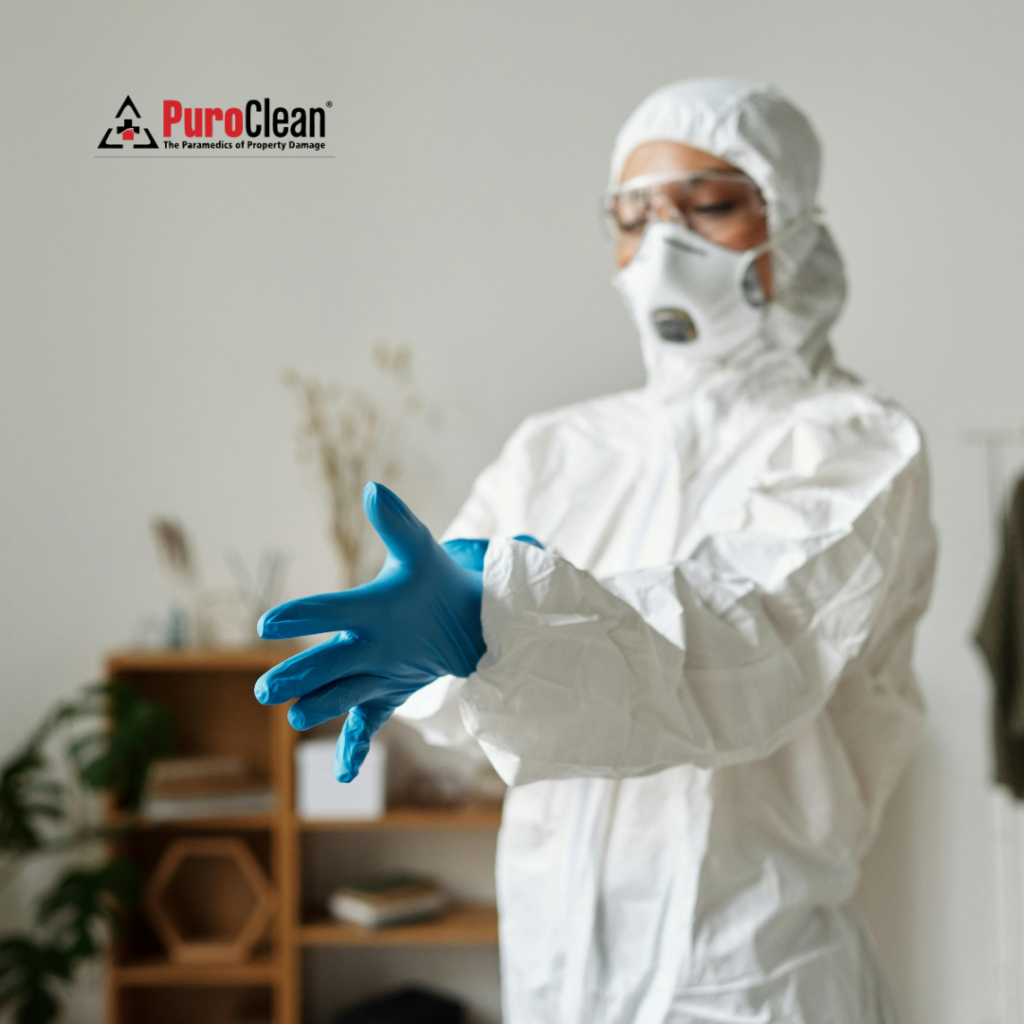

Have you had a sewer backup? Are you in need of crime scene cleanup services? Has an infectious illness or death rocked your home or business? PuroClean of Hempstead provides a full range of biohazard removal services, including the use of PuroClean RapidDefense™ Program for an Influenza or Norovirus outbreak. It is important that biohazard removal is completed with special attention to the safety of everyone involved. The team at PuroClean of Hempstead will carefully contain the area, remove any materials that are not salvageable, and then sanitize those that remain. If there are any lingering odors, our trained technicians will deodorize the area and return your Hempstead, Garden City, NY area property back to pre-loss condition, with empathy and care.
PuroClean restoration professionals are licensed, insured, and certified to remediate biohazard environments safely and in accordance with all applicable laws and standards. We understand that some events may be sensitive and must be handled with compassion and discretion. We bring a sense of calm back to those impacted, whether the loss is in a home, a commercial housing property, or another business office.
Biohazard cleanup involves cleaning, sanitizing, and deodorizing areas where a traumatic event such as an accident, injury, or death has occurred. Thus, dealing with biohazards often means dealing with blood, human or animal remains, chemical spills, and more. Keep in mind that the state is not responsible for cleaning up a crime scene. After police investigators collect evidence from the scene, it is up to the property owner to seek biohazard cleaning services. A professional cleanup team can arrive on site only after the police have gathered enough evidence related to the crime.

The Blood or Other Potentially Infectious Materials (BOPIM) Standard
In 1991, the Occupational Safety and Health Administration (OSHA) issued a standard to protect workers from the risk of blood or other potentially infectious materials (BOPIM). Infectious pathogens include the Hepatitis B virus, HIV, and many others. This standard helps protect approximately 5.6 million workers in the healthcare industry and related occupations. Biohazard remediation falls within the scope of the BOPIM standard. Also, the BOPIM standard has several requirements, including:
Every time technicians handle potentially hazardous materials, they are put at significant risk. Thus, following proper training and safety procedures is crucial. It’s important not only for themselves but also for the individuals who will reside in the property after the biohazard cleanup is complete.
To begin, we provide a full assessment of the incident and the area(s) affected. We will determine the level of containment needed and inform you of the plan of action.
It is key to perform biohazard removal with special attention to safety and industry and OSHA standards. Our trained technicians wear special personal protective equipment to keep themselves safe. They also contain the area, taking the appropriate steps to keep you and your family or employees safe as well.
Hazardous medical waste, such as spinal fluid, peritoneal fluid, amniotic fluid, and other bodily fluids, is handled following OSHA regulations. It’s then sent to a licensed hazardous medical waste incinerator.
All affected porous material will be removed in accordance with industry standards and state regulations. All other infectious material will be safely discarded as well. For non-porous surfaces, we will dry the affected area before applying a disinfectant. After allowing this to soak, we scrub, repeating the process to disinfect the space.
Typically, once the biohazard is cleaned and the area sanitized, odors dissipate. However, our crew will determine whether further deodorization is necessary. If so, we use hydroxyls or ozone to ensure the odor is gone.
Professionals have the equipment and training to safely clean up biohazards without further contamination. This will reduce the likelihood of illness spreading to others at the home or office. Call PuroClean of Hempstead at (516) 399-4400 and rest assured that your property is in good hands.
Biohazards are any biological contaminants that have the risk of carrying disease, such as those found in sewage, mold, or any viral or bacterial contamination such as MRSA. Biohazards also include toxins found in decaying organisms, as well as bodily fluids.
Many insurance policies cover biohazard and crime scene cleanup. Check with your insurance provider to confirm the details of your specific policy.
It is not obligatory to obtain a certificate to become a biohazard technician. However, OSHA does require biohazard technicians to properly wear PPE when dealing with bloodborne pathogens.
In essence, PPE helps ensure the safety of workers. The equipment prevents hazardous material from entering the body through the skin, eyes, mouth, nose, or any other area. Although PPE varies from job to job, it should always include full-face protection, gloves, properly designated waterproof coveralls, and a respirator.
Furthermore, reputable restoration companies like PuroClean of Hempstead offer biohazard remediation training for technicians. That includes learning OSHA’s on-the-job safety methods when handling biohazardous waste.
Our list of continuing education courses for insurance agents offered across the country is constantly being updated. Make sure to sign up to get notified of new CEs, industry events and more.
OUTSTANDING SERVICE
Tamarac
As with any virus, the Coronavirus spreads when an infected person coughs or sneezes, and any respiratory droplets come in contact with another person. Keeping a good distance from infected [...]
“Coronavirus” is an umbrella term for many types of viruses. This group of viruses has been known for decades and can cause respiratory diseases in both people and animals. What [...]
If someone in close proximity to you is coughing or sneezing, be sure to maintain at least 6 feet (2 meters) distance between yourself and the person who is coughing [...]
Blood itself is not a biohazard, it’s what may be in the potentially hazardous blood, such as bloodborne pathogens (BBPs) or infectious microorganisms, that can cause diseases. [...]
The Center for Disease Control and Prevention (CDC) requests that we all do our part to slow the spread of the coronavirus. We can do this by avoiding close contact [...]